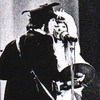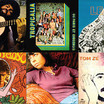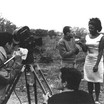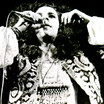Ilumencarnados seres

gilberto gil
Interviews
Ana de Oliveira – To what extent did your contact with Pernambuco’s popular culture and with the Beatles motivate your Tropicalista initiative?
Gilberto Gil – In Caruaru, I saw the cirandas and the Banda de Pífanos. The strong northeastern characteristic that Pernambuco concentrates very well had touched me deeply, making me search at the same time for the specification and diversity of the Brazilian thing. But I also listened to the Beatles, and at that time Sargent Pepper’s Lonely Hearts Club Band was released, impressing me a lot because of George Martin’s boldness and experimentalism. This album made me feel committed to the idea of transformation, the idea that music could go beyond the point where it had decanted in us from the conventional. Our first contact with the music avant-garde, Hélio Oiticica and Antônio Dias’ art, Glauber Rocha’s Cinema Novo (New Cinema), Zé Celso’s Teatro Oficina also happened at that time. It all made a sense of adventure pulse in our hearts and minds.
Ana de Oliveira – What was the role of the music festivals in the origins of Tropicalismo?
Gilberto Gil – There was a very strong atmosphere of new music in them, generated by Bossa Nova, instigated by the Jovem Guarda. The festivals were expected to be a privileged space for our propositions. Caetano wrote “Alegria, Alegria,” I wrote “Domingo no Parque.” I imagined that Rogério Duprat could do for us, in the case of “Domingo no Parque,” something like what George Martin had done for the Beatles: introduce modern orchestral elements in the arrangements, such as the dodecaphony’s ones. Through Rogério we also met the Mutantes, who accompanied me in “Domingo no Parque.” Caetano called the Beat Boys to accompany him in “Alegria, Alegria,” an Argentinean group settled in São Paulo who had a drawing inspired by the Beatles. That, in fact marked the beginning of the Tropicalista thing.
Ana de Oliveira – Can you imagine what might have been the immediate evolvement of the Tropicalista movement from the point where it stopped?
Gilberto Gil – It’s hard to know. The true historical phenomena that become landmarks, are characterized many times by dysfunction. I mean, they truly reveal themselves when they stop functioning, because it’s then that they become a mark. If Tropicalismo had not been interrupted, it probably wouldn’t have had the importance it did.
Ana de Oliveira – You mean that Tropicália’s own interruption, its sudden and unexpected break made it what it is?
Gilberto Gil – Perhaps. Even if much of what was produced stayed and evolved into other things, it would not have had the historical mark it does. It would not draw analytical curiosity. In fact, Tropicalismo’s sudden interruption is what consolidates the rupture that it aimed at provoking in Brazilian music and art.
Ana de Oliveira – As it turns out, it seems that everything was causing you all too much suffering.
Gilberto Gil – Too much! For confrontation had been the representative aspect. It was not what I wanted. What moved me was the spirit of aesthetic transformation. As a matter of fact, isn’t one of Tropicalismo characteristics the inclusion of everything? To make the various ways of artistically translating reality dialogue with each-other… At first, I wanted everybody to participate. But we ended up isolated. An antagonized ghetto. We were obliged to throw hostility back, with an aggressive discourse.
Ana de Oliveira – Could you talk about your experience in prison?
Gilberto Gil – The moment I was arrested I was relieved to find out that my paranoia was not absurd. Prison was unacceptable from any point of view, from the existential point of view; it was there that I found yoga, macrobiotics, an ascetic view of life as the complementation of the being. Of course there was an initial shock, all the privations that prison represents. But when I absorbed this shock I understood that it had happened because of what we had experienced before. Then my soul was freed to search for levitation, for a higher flight. This corresponds also to a deeper internal journey.
Ana de Oliveira – What about exile? There was a positive side in exile. You recorded an album…
Gilberto Gil – To me, exile was almost all positive in spite of my home-sickness and the military vigilance, forbidding us to come back to Brazil. But at the same time I considered the perspective of never coming back. I thought: if I could never return to Brazil, then I would have to live here and “apesar de um mal tamanho, alegrar meu coração” (in spite of such terrible harm, joy my heart).
Ana de Oliveira – Why did you chose to live your exile in London?
Gilberto Gil – Because it was the land of the Beatles and the Rolling Stones. Everything was very seductive, with hippies, bunches of youngsters, the festivals, psychedelia… That civilized land going through a barbarian permissiveness again. A mega-barbarity.
Ana de Oliveira – Did Tropicália intend to be violent? You provoked the audience.
Gilberto Gil – Yes! But to me it was all at the level of the challenging guitar players, in the artistic sense. The war as representation, not as reality. When it became a total war it started to bother me, it scared me a lot.
Ana de Oliveira – What event at the International Song Festival specially marked you?
Gilberto Gil – Well, I was there, in the audience, watching “É Proibido Proibir.” Caetano interrupted the performance, started the speech, I was going on stage. The enraged crowd was throwing things and I was there, in the middle of it all, experiencing the heat of the public performance. I was afraid. But at the same time, deep inside of me I had a certain ironic smile. They did not understand that we did not want confrontation, that our objective was to bring a bigger and bigger number of people to enjoy our new ways of creation. I knew it, that’s why I had my ironic smile.
Ana de Oliveira – In the last years, Tropicália has drawn an enormous attention in the United States and in some European countries. For what do you attribute this fact so many years latter?
Gilberto Gil – Certain social phenomena, specially when they are ephemera and restricted to a peripheral society, can only become clear within time distance. Only today people are far enough to have a historical interest in that. To the new generation, that is history, not life. Here in Brazil, specially, this renewed interest arose in the universities, where young people who had not been born at that time study. And it was the only musical movement with a consecrated rebel character.
Ana de Oliveira – How do you think foreigners grasp something so internalized in the history of Brazil?
Gilberto Gil – From the foreigner’s point of view, Tropicália is connected to a group of cultural signs which express the idea of Brazilian originality, like our Modernism and so many other cultural movements that assert the intrinsic quality that distinguishes Brazil from other lands. In today’s world you have European countries, important because of their accumulated history, cultural and economic presence, civilization’s diffusible axle, strong and influent. Along with them, the USA has come up, the first successful New World’s offspring, which receives other countries, India and China, even more significant for their ancient history, large populations and continents. From all these, Brazil is the newest big country in the world. It is, therefore, a child that draws curiosity. Brazil is the first on the list of countries towards which the world view is turned in the XXI century.
Ana de Oliveira – But foreigners, especially the Americans, get surprised with the fact that an avant-garde movement as complex as the Tropicália arose in Brazil in sixty decade.
Gilberto Gil – Tropicália is a recent manifestation, as the Week of 22. The world is beginning to notice that Brazil has been forming itself in layers. For the first time there is an international interest in analyzing the Brazilian cultural archeology. Tropicália fits this interest well, because it discussed which extracts, popular, non-mentioned, composed the Brazilian culture.
Ana de Oliveira – What is your analysis of Tropicália’s heritage?
Gilberto Gil – Well, first of all, its heritage is in ourselves, who are still here: Caetano, I, Tom Zé, Rogério Duarte. We keep basically Tropicalistas. Our work proves it. We make use of our post-Tropicalista experience to manifest certain things that had been embryonic. Beyond our persons, a lot of Tropicalista things came up. A possibility for the avant-garde music to come out in Brazil, with Hermeto Paschoal, Egberto Gismonti, Naná Vasconcelos… There is a flow of Tropicalista elements into many works, especially into the most performatic ones.
Ana de Oliveira – Just as Tropicalismo descended from the Week of 22, certain current artistic manifestations descend from Tropicalismo.
Gilberto Gil – Caetano calls it a developmental line. One’s hands becoming the other’s feet… The Tropicalistas’ feet laid themselves on the modernist hands. The feet of the current pop laid on the Tropicalistas’ hands. And so on, as a circus pyramids. The cultural pyramids are like that too. Tropicalismo is a stone in that pyramid. It does not matter what level it is on. But if you take away this stone, the whole pyramid falls apart. It also doesn’t make any difference whether it is on the bottom or on the top. I don’t like to point Tropicalistas. What we have are Tropicalismos dressed in other costumes, transfigured. New bodies with the same old Tropicalista soul.




















